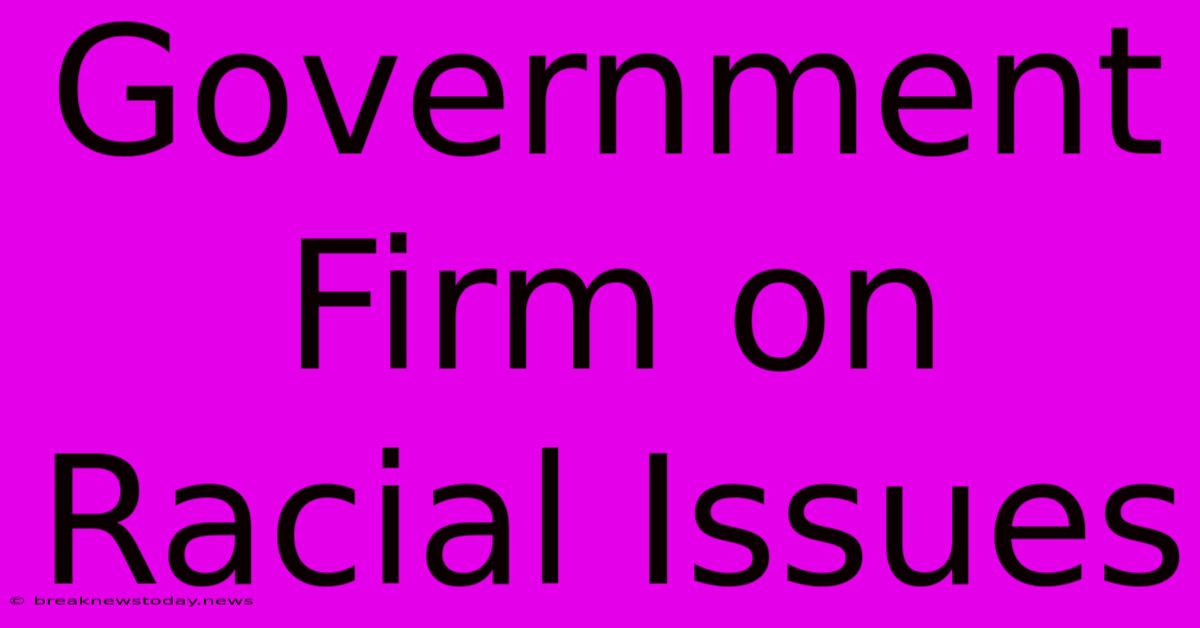Government Firm On Racial Issues

Discover more detailed and exciting information on our website. Click the link below to start your adventure: Visit Best Website naughtynakes.com. Don't miss out!
Table of Contents
Government Firm on Racial Issues: A Critical Examination
The issue of race in society is complex and multifaceted. While progress has been made in dismantling systemic racism, ongoing injustices and disparities remain deeply embedded in our institutions. The role of government in addressing racial issues is paramount, but its effectiveness and approach are often the subject of intense debate.
This article will delve into the complexities of government action on racial issues, examining both its successes and failures, and exploring the potential for a more just and equitable future.
The Government's Role in Addressing Racial Issues
Governments have a crucial role to play in combating racial discrimination and inequality. This responsibility stems from their mandate to protect the rights of all citizens and ensure equal opportunities. Here are some key areas where government action is critical:
- Legislation and Policy: Governments enact laws and policies designed to prevent discrimination and promote equality. This includes anti-discrimination laws in employment, housing, education, and other areas.
- Enforcement and Oversight: Government agencies are responsible for enforcing anti-discrimination laws and investigating allegations of bias. This involves monitoring compliance, conducting audits, and pursuing legal action against violators.
- Resource Allocation: Government funding plays a significant role in addressing racial disparities. Allocating resources to communities of color in areas like education, healthcare, and infrastructure can help to level the playing field.
- Public Education and Awareness: Governments can contribute to public understanding of racial issues through awareness campaigns, educational programs, and promoting diversity and inclusion in public spaces.
Challenges and Critiques of Government Action
Despite the crucial role of government, its efforts to address racial issues are not without their challenges and criticisms. Some key issues include:
- Lack of Political Will: The commitment of political leaders to address racial injustice can vary greatly. This can lead to a lack of funding, limited policy implementation, and inaction on pressing issues.
- Systemic Bias: Government institutions themselves can perpetuate systemic bias, even with good intentions. This can manifest in discriminatory policies, disproportionate law enforcement, and unequal access to services.
- Limited Accountability: Holding government accountable for addressing racial disparities can be challenging. Transparency and oversight are crucial to ensure that actions are effective and not simply symbolic.
- Community Engagement: Effective government action requires genuine engagement with communities of color. This involves listening to their concerns, building trust, and collaborating on solutions.
Moving Forward: Towards a More Just Future
While challenges exist, there are steps that governments can take to improve their effectiveness in addressing racial issues. Some key strategies include:
- Data-Driven Decision Making: Collecting and analyzing data on racial disparities is essential to identifying specific areas where intervention is needed.
- Investing in Community-Based Organizations: Partnering with and providing resources to community organizations that are deeply rooted in communities of color can leverage their expertise and build trust.
- Addressing Systemic Bias: Actively reviewing and reforming policies and practices to eliminate implicit bias and ensure equitable outcomes.
- Promoting Diversity and Inclusion: Prioritizing diversity and inclusion in government leadership, employment, and service delivery.
Addressing racial issues requires a multifaceted approach, with government playing a critical role. By acknowledging challenges, fostering collaboration, and embracing evidence-based solutions, governments can strive for a more just and equitable society for all.

Thank you for visiting our website wich cover about Government Firm On Racial Issues. We hope the information provided has been useful to you. Feel free to contact us if you have any questions or need further assistance. See you next time and dont miss to bookmark.
Featured Posts
-
Kenduri Rakyat At Upnm Mosque Pms Visit
Nov 02, 2024
-
Lluvia Interrumpe Jaguares Vs Pereira 0 1
Nov 02, 2024
-
Viktige Mal Lederartikkel Om Samarbeid
Nov 02, 2024
-
More South Africans Planning Electric Car Buys
Nov 02, 2024
-
2023 Word Of The Year Confident Mess
Nov 02, 2024
